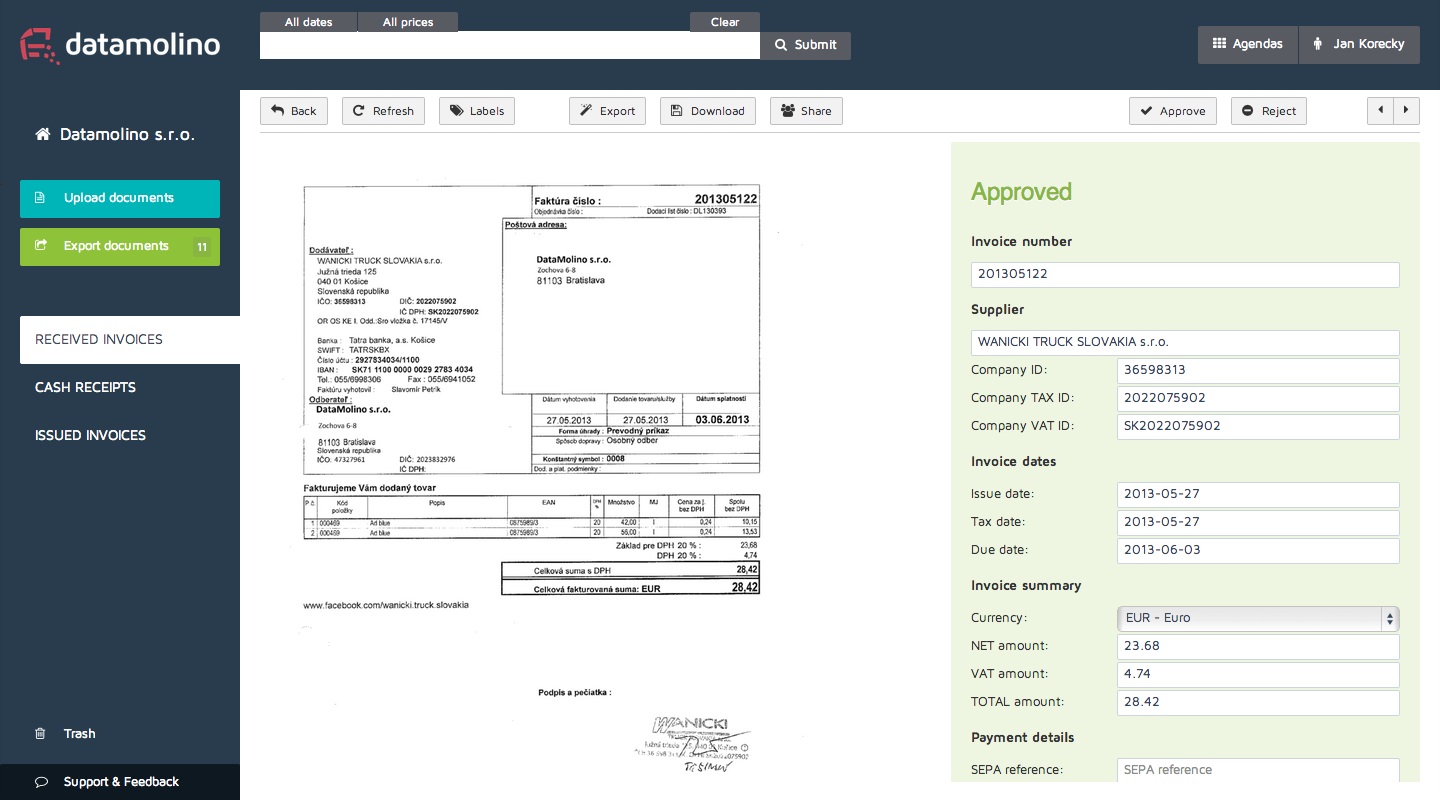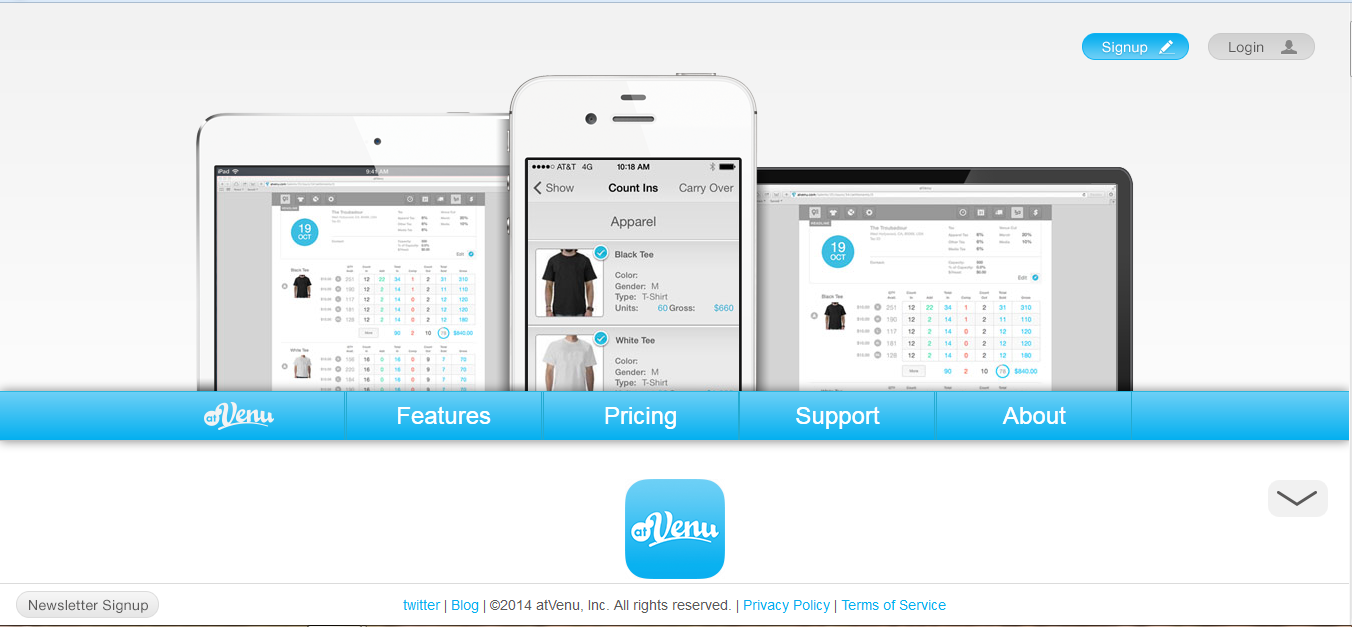 A Q&A with Datamolino founder and CEO Andrej Glézl. The Bratislava, Slovakia-based startup, which offers software that turns invoices and receipts into e-documents that integrate into existing accounting systems, announced in early February the completion of a €500,000 Seed funding round from the Slovak Innovations and Technologies Fund (FIT). The company was founded in 2013 and is a graduate of the Wayra Central and Eastern Europe Academy.
A Q&A with Datamolino founder and CEO Andrej Glézl. The Bratislava, Slovakia-based startup, which offers software that turns invoices and receipts into e-documents that integrate into existing accounting systems, announced in early February the completion of a €500,000 Seed funding round from the Slovak Innovations and Technologies Fund (FIT). The company was founded in 2013 and is a graduate of the Wayra Central and Eastern Europe Academy.
 SUB: Please describe Datamolino and your primary innovation.
SUB: Please describe Datamolino and your primary innovation.
Glézl: Datamolino turns invoices and receipts into a searchable, secure online archive. It enables you to receive, approve, and easily share invoices with the right people, saving your business time and money. The innovative element of Datamolino is that we provide all the above services through a simple ‘Gmail-like’ interface, rather than you having to implement a complex software and processing solution in-house.
SUB: Who are your target markets and users?
Glézl: We operate on a global market. Our users are accounting professionals that process paper or PDF invoices and use accounting software for bookkeeping.
SUB: Who do you consider to be your competition, and what differentiates Datamolino from the competition?
Glézl: Our competition includes Shoeboxed, Receipt Bank, Invitbox, Basware, Celaton. The quality of the service provided will be the key differentiator in the long run. The market is big enough to accommodate various service providers.
SUB: You just announced that you’ve raised €500,000 in Seed funding. Why was this a particularly good time to raise funding?
Glézl: Our business needed further funds to finance our expansion plans; and there were good financing offers in the market. Supply met demand.
SUB: How do you plan to use the funds?
Glézl: We plan to use the funds on further product development and its integration into various ERP systems. We also need to finance our marketing efforts and customer support.
 SUB: What was the inspiration behind the idea for Datamolino? Was there an ‘aha’ moment, or was the idea more gradual in developing?
SUB: What was the inspiration behind the idea for Datamolino? Was there an ‘aha’ moment, or was the idea more gradual in developing?
Glézl: It started with a project where we used QR codes as carriers of financial information. We provided a software tool for mobile banking applications in Slovakia that allowed [users] to instantly create payment orders from invoices. We almost instantly received requests from potential customers to build a functionality that would be able to process whole invoices without data entry. We built Datamolino on top of such customer requests and feedback.
SUB: What were the first steps you took in establishing the company?
Glézl: Acceleration with Wayra, a global accelerator of Telefonica, was the first step we took. Being accepted into this acceleration program validated our basic business concept. Together with Wayra funding, we pooled together our founders’ equity and started the development.
SUB: How did you come up with the name? What is the story or meaning behind it?
Glézl: Hours-and-hours of online research, and some luck. Datamolino is a combination of the words ‘data’ and ‘molino.’ ‘Molino’ means ‘mill’ in Spanish, and being able to grind information—data—from unstructured documents is the key value of our product and service offering. And also, it just sounded nice, no matter what language you use it in. That was also very important to us.
SUB: Do you have plans to seek additional outside funding in the near future?
Glézl: We are building our company to be able to attract Series A round of financing in early 2015, in case such funding will be necessary or important at that stage of our development.
 SUB: What have the most significant challenges been so far to building the company?
SUB: What have the most significant challenges been so far to building the company?
Glézl: It’s all about the people in the early stages, so building a solid team has been the most challenging aspect so far. We have a very solid team now, and we are planning to invest into it.
SUB: How do you generate revenue or plan to generate revenue?
Glézl: We are still pre-revenue. We plan to generate revenue from customer subscription fees. We are now working on our pricing policy and seeking feedback from our customers in order to price our product well.
SUB: What are your goals for Datamolino over the next year or so?
Glézl: We plan to gradually introduce Datamolino in various countries and form partnerships with integrators and distributors that will enable us to grow at a pace that we will be able to sustain.












